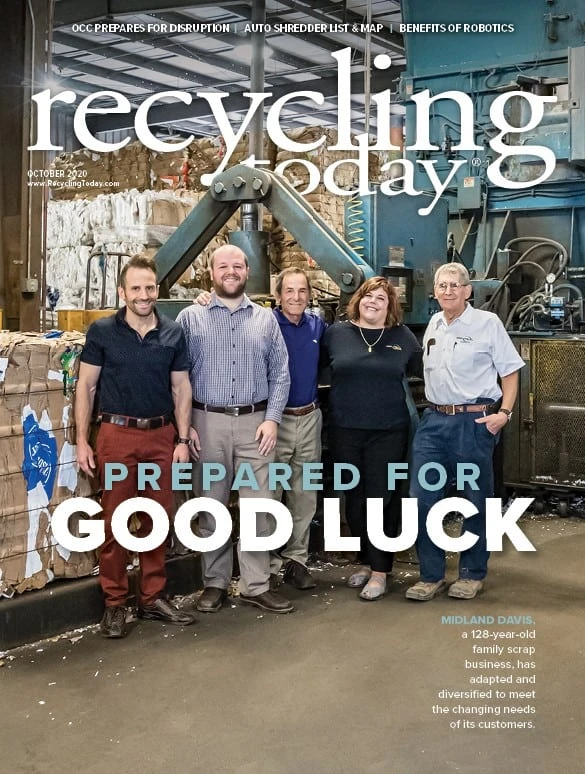
In this issue of Recycling Today, we share our latest Auto Shredder List and Map. Recycling Today uses the term “auto shredder” to describe the stationary and mobile hammer mill shredders that are capable of processing appliances, automobiles and other forms of ferrous and aluminum scrap. And by our count, the number of these shredders installed across the U.S. has grown since 2018 when Recycling Today last updated this list. (Click here for this year’s list, which was sponsored by SGM Magnetics.)
Also growing, however, is the scrutiny these shredders are receiving, particularly when it comes to air emissions of volatile organic compounds (VOCs). Auto shredder operators, particularly those in urban regions, are finding themselves being tapped for air emissions testing and monitoring by the U.S. Environmental Protection Agency.
“Also growing is the scrutiny these shredders are receiving, particularly when it comes to air emissions of volatile organic compounds.”
General Iron Industries in Chicago is among the recyclers that have added thermal oxidizers to their auto shredders in response to this scrutiny. While the company says its actual VOC emissions from the shredder, averaged annually over five years, were about 0.17 percent of the VOC emissions from all stationary sources across Cook County in 2014, based on Illinois EPA data submitted to the U.S. EPA’s National Emissions Inventory, the EPA’s testing showed the company’s “potential to emit” could exceed permitted requirements, necessitating the addition of the thermal oxidizer.
Other shredder operators also have been targeted for air emissions testing by the EPA, as detailed in Senior Editor Brian Taylor’s article “Still a foremost option,” beginning on page 66 of this issue. In this article, Kevin Gershowitz of Gershow Recycling, headquartered in Medford, New York, describes how he fears the scrutiny on shredders that operate in nonattainment zones, which tend to be in urban areas and inner-ring suburbs, will create competitive advantages for those in outlying areas if implementation is inconsistent, as it appears to have been to date. Gershowitz warns that scrap could end up crossing state and county lines to lower cost operators who do not have the added expense of installing and operating a thermal oxidizer, potentially allowing them to pay more for the material.
General Iron and Gershow Recycling operate large stationary shredders. However, what remains to be seen is whether smaller mobile shredders could be subject to the same emissions scrutiny.
Sponsored Content
Labor that Works
With 25 years of experience, Leadpoint delivers cost-effective workforce solutions tailored to your needs. We handle the recruiting, hiring, training, and onboarding to deliver stable, productive, and safety-focused teams. Our commitment to safety and quality ensures peace of mind with a reliable workforce that helps you achieve your goals.
Sponsored Content
Labor that Works
With 25 years of experience, Leadpoint delivers cost-effective workforce solutions tailored to your needs. We handle the recruiting, hiring, training, and onboarding to deliver stable, productive, and safety-focused teams. Our commitment to safety and quality ensures peace of mind with a reliable workforce that helps you achieve your goals.
Sponsored Content
Labor that Works
With 25 years of experience, Leadpoint delivers cost-effective workforce solutions tailored to your needs. We handle the recruiting, hiring, training, and onboarding to deliver stable, productive, and safety-focused teams. Our commitment to safety and quality ensures peace of mind with a reliable workforce that helps you achieve your goals.
Sponsored Content
Labor that Works
With 25 years of experience, Leadpoint delivers cost-effective workforce solutions tailored to your needs. We handle the recruiting, hiring, training, and onboarding to deliver stable, productive, and safety-focused teams. Our commitment to safety and quality ensures peace of mind with a reliable workforce that helps you achieve your goals.
Sponsored Content
Labor that Works
With 25 years of experience, Leadpoint delivers cost-effective workforce solutions tailored to your needs. We handle the recruiting, hiring, training, and onboarding to deliver stable, productive, and safety-focused teams. Our commitment to safety and quality ensures peace of mind with a reliable workforce that helps you achieve your goals.
Sponsored Content
Labor that Works
With 25 years of experience, Leadpoint delivers cost-effective workforce solutions tailored to your needs. We handle the recruiting, hiring, training, and onboarding to deliver stable, productive, and safety-focused teams. Our commitment to safety and quality ensures peace of mind with a reliable workforce that helps you achieve your goals.
Get curated news on YOUR industry.
Enter your email to receive our newsletters.

Explore the October 2020 Issue
Check out more from this issue and find your next story to read.
Latest from Recycling Today
- Green Cubes unveils forklift battery line
- Rebar association points to trade turmoil
- LumiCup offers single-use plastic alternative
- European project yields recycled-content ABS
- ICM to host colocated events in Shanghai
- Astera runs into NIMBY concerns in Colorado
- ReMA opposes European efforts seeking export restrictions for recyclables
- Fresh Perspective: Raj Bagaria






